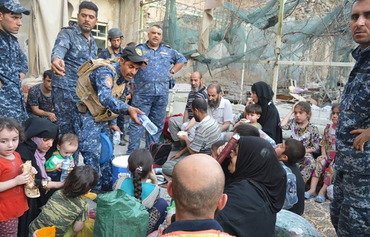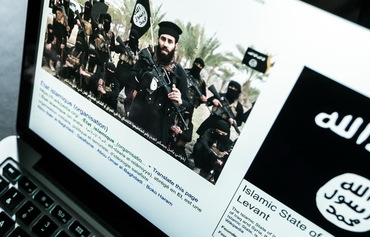Conspiracy theories, fake reports and mudslinging -- in Iraq, false news thrives and risks real-life consequences as authorities struggle to counteract its spread.
Misinformation about political, social, security and economic issues abounds online in the country, said an official from the Tech 4 Peace collective, an Iraqi organisation that tracks "fake news".
"There are hundreds of pages circulating false information on Facebook and Twitter," the official, who did not wish to be named, told AFP.
"Iraq has become a virtual battleground of fake news" both in local politics and among major international players vying for influence in the tinderbox country, the official said.
![Cyber armies in Iraq are tasked with posting misinformation and invective against opponents of the Iranian regime's influence in Iraq. [Photo circulated online]](/cnmi_di/images/2021/07/05/30577-iraq-cyber-armies-600_384.jpg)
Cyber armies in Iraq are tasked with posting misinformation and invective against opponents of the Iranian regime's influence in Iraq. [Photo circulated online]
![A member of the Iraqi Interior Ministry's anti-'fake news' team speaks to a shopkeeper in Baghdad on May 20, as part of a campaign to spread awareness among the population about the danger and legal consequences of fake news that often circulate on social media. [Ahmad al-Rubaye/AFP]](/cnmi_di/images/2021/07/05/30578-iraq-misinfo-awareness-600_384.jpg)
A member of the Iraqi Interior Ministry's anti-'fake news' team speaks to a shopkeeper in Baghdad on May 20, as part of a campaign to spread awareness among the population about the danger and legal consequences of fake news that often circulate on social media. [Ahmad al-Rubaye/AFP]
"And it is a free-for-all."
The official pointed to an incident that happened in January as tense relations between Saudi Arabia and Iraq were easing with the re-opening of the Arar border crossing between the neighbours.
Radical groups loyal to Iran launched a campaign on social media accusing a Saudi national of carrying out a double suicide attack in Baghdad that killed 32 people.
His picture was published on Twitter and Facebook and widely shared, even though it was revealed that he had in fact blown himself up in a rare suicide attack in Saudi Arabia in 2015.
The "Islamic State of Iraq and Syria" (ISIS) eventually claimed the Baghdad bombing.
The campaign is not an isolated incident.
Iran-backed militias have been known to use a "cyber army" to post disinformation and invective against those opposed to the Iranian regime's influence in Iraq, and in some cases this targeting paves the way for future assassinations.
The activities of these cyber groups are carried out in an organised manner and co-ordinated with influential militias, according to Iraqi journalist Shaho al-Qaradaghi.
When these militias decide to eliminate an opponent, the cyber units launch a media campaign against that individual, publishing defamatory posts that may include accusations of treason, he said in February.
Stirring up division
Concerns over the impact of misinformation has prompted Iraqi authorities to set up a "surveillance service" tasked with tracking information.
Iraq's Interior Ministry staff members typically spend hours in an office full of computer and television screens monitoring endless streams of news on television and online.
"When a piece of information seems suspect, they raise the alarm" and an investigation is carried out to confirm or debunk the news, said Gen. Nebras Mohammad, who heads the misinformation department, which includes the surveillance service.
About 25 million Iraqis use social media, according to DataReportal figures, but only 34,000 of them follow the surveillance service's Facebook page, where debunked false news is posted.
The Tech 4 Peace official said that Facebook is being used as "the main vehicle for false news in Iraq", and that there is a new trending fake story "almost daily".
Some of it is ultimately harmless, like recent widely shared posts claiming a young man from Mosul had married four girls in one day that was shown by Tech 4 Peace to be a promotion for a beauty salon.
But some cases are more insidious, such as taking advantage of a blaze at a COVID-19 hospital in Baghdad in late April that killed 82 people to garner likes and follows by posting fabricated reports of more fires at other health centres.
Sometimes misinformation takes on a more political slant, stirring up still latent sectarian tensions in the country.
"These are organised campaigns of thousands of pages, mainly via Twitter, with political objectives," led by both pro-Iranian factions and their opponents, the Tech 4 Peace official said.
"Millions of dollars are spent" on this, the official added.
Raising awareness
Mohammad said the anti-"fake news" team has stepped up grassroots campaigns that include distributing leaflets and raising awareness about legal consequences of spreading false information.
Many young plugged-in Iraqis, like 24-year-old student Abdullah, take it upon themselves to verify their sources of information.
"I don't trust news that I read at first glance; I first check the source," he told AFP.
Laws that criminalise the spread of false information have not been updated in Iraq since 1969.
A new draft cybercrimes law is under consideration by the country's parliament, but it has already come under fire from rights groups, including Human Rights Watch, which said it "could be used to stifle free expression".

![A member of the Iraqi Interior Ministry's anti-'fake news' team, accompanied by policemen, tours the streets of Baghdad on May 20 as part of a campaign to spread awareness among the population about the danger and legal consequences of fake news that often circulate on social media. [Ahmad al-Rubaye/AFP]](/cnmi_di/images/2021/07/05/30576-iraq-misinfo-600_384.jpg)






